MALCOLM ARNOLD EDITION
Decca 13 CDs
and Tony Palmer's Film Towards the Unknown Region
Isolde DVD
VOLUME 1 THE COMPLETE SYMPHONIES
Decca 4765337 0
5CDs
VOLUME 2
17 CONCERTOS
4765343 1
4CDs
VOLUME 3 ORCHESTRAL,
BRASS & PIANO MUSIC
4765348 6
4CDs
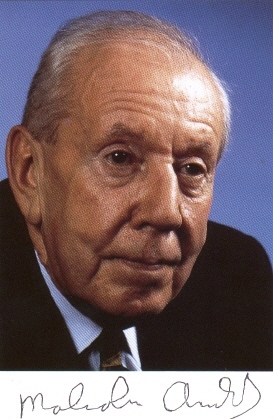
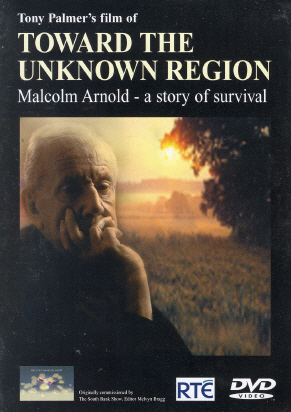
Isolde Films IS0001
Digital Classics
|
|
Sir Malcolm Arnold CBE (1921-2006)
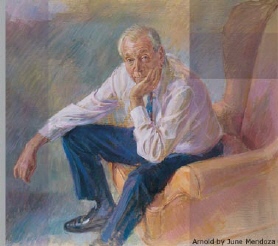
Malcolm Arnold was an almost exact contemporary of the never frivolous symphonist Robert Simpson (1921-1997), who was associated with "the rigorous pursuit of the absolute essentials of symphonic form" and "reaffirmation of tonal principles in the symphonic context" (Calum MacDonald).
Arnold's attitude was far more laid back, susceptible to the joys of good tunes and colouful orchestration and, above all, engagement with music as "a social act of communication" with the pleasures and pains of real life, "a gesture of friendship, the strongest there is".
Arnold's concert music received for review in this enticing Decca collection of the 13 CDs has proved an unexpectedly felicitous journey of exploration.
The complete symphonies of both composers, eleven of Simpson's to nine of Arnold's, have been recorded by Vernon Handley to wide acclaim. Sampling their respective No 6s, we found Simpson's worthy but draining rather than inspiring; Arnold's from the late sixties - characterised by Decca's commentator as succinct and intimate, disturbing and unsettling - far more engaging, with its striking orchestration and incorporation of wide ranging influences.
I had in fact requested just the symphonies, and found the receipt of the entire thirteen CDs of Sir Malcolm Arnold's concert music an initially intimidating and daunting prospect.
The cover portrait is pensive and a bit wishy-washy in reproduction on each of the three boxes, but it looks fine on the wall of his final home as seen in the DVD film (above). I like also the autographed photo copied from an excellent overview (R.E.B. 2005).
Tony Palmer's film, which I recommend most strongly, is by turns invigorating and unbearably poignant. I rate it as indispensable to all who would like to take part in the posthumous revaluation of this important British composer, paradoxically the most recorded yet most neglected of all of his generation.
Arnold was a prodigy, with facility comparable to Mozart's. He composed some 500 works, straight with pen onto full score - "Malcolm writes music quicker than it takes the ink to dry".
His life was a roller-coaster between extrovert success as a trumpeter and conductor, profligate with his huge earnings, enjoying may years of gregarious popularity as a roistering drinking companion (his Achilles heel), and behind it all a disastrous personal life with two divorces, children estranged and the tragedy that his youngest son was autistic.
Drastic treatments in mental hospitals, suicide attempts, leading to his reduction to psychotic babbling in one clip in the film which I found hard to take; succour and a modicum of salvation towards the end with a kindly professional carer; we are spared none of the ups and downs. During most of my listening life Malcolm Arnold was sidelined, belittled by critics and ignored by orchestras and the BBC (which rejected his 9th symphony for broadcasting). I had occasionally heard an overture or a symphony, perhaps a concerto, but never taken them seriously nor was urged to do so.
It was that spare, tragic 9th which haunted me after it finally surfaced, and has prompted me to catch up.
Sampling the three boxes of music, mostly reissues from the Conifer label - many of the works successful in their day, but latterly overlooked - has confirmed Arnold's innovatory way within the self-imposed rejection of post-tonal methods of composition. There is rarely a work without some surprises, and the juxtaposition of high spirits and underlying pain and sadness is very personal to his music. There are evident links to life events; the writing for orchestra always displays indomitable energy in brilliant orchestration.
The boxes are packed sensibly and compactly, with good liner notes and excellent documentation.
Explore the Malcolm Arnold website and don't fail to consider these releases for your collections; you may be as pleasantly surprised as we have been.
Peter Grahame Woolf
Below, Ying Chang offers an overview of Arnold and Robert Simpson in a comparative essay about the two composers.
For detailed reviews of the Arnold Concertos and piano music with track-listings I commend you to Rob Barnett's comprehensive contributions to Music on the Web. PGW
|
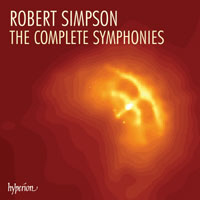
Robert Simpson: Complete symphonies
Var artists: RPO, BSO, RLPO, City of London Sinfonia/ Handley, Taylor
Hyperion CDS44191-7
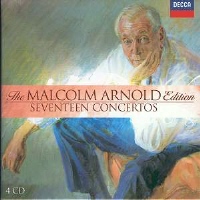
Malcolm Arnold: Piano concertos Solo Piano Music
from Decca's complete Arnold edition
Nettle and Markham, John Lill, Benjamin Frith (pianos)
|
|
Malcolm Arnold and Robert Simpson: the Fox and the Hedgehog
Isaiah Berlin famously wrote an essay called the Hedgehog and the Fox. Everybody is either one of the other, he said, quoting an ancient Greek fragment: The Fox knows many things, but the Hedgehog knows one big thing.' In the musical cosmos, the two major complete editions of Malcolm Arnold and Robert Simpson allow us in turn to say Arnold is a fox and Simpson is a hedgehog.
Both composers were, in very different ways, pillars of the English musical establishment. Simpson was a dyed-in-the-wool traditionalist that is to say, he sought to be contemporary and innovatory in deeply traditional ways. For him, the symphony, the string quartet, the decisive development of the Classical style under Haydn and Beethoven remained the foundations for what should be built upon them. Arnold had a quickness and facility of almost Mozartean proportions; he was legendary for writing film scores in a week, for understanding the characteristics not only of the brass (he was a trumpeter) but of every instrument, for taking inspiration from jazz and popular genres.
Simpson's symphonies have very obvious affinities with Sibelius, Nielsen and Shostakovich (he championed Nielsen to the British public, as well as being instrumental in bringing Havergal Brian to its attention); the choice of the symphony as the key compositional form of our times nailed his colours to the mast. Arnold's concertos and solo piano music is fleet, allusive, reminiscent of Tippett, or Poulenc's Les Biches , sometimes, as in the finale of the three-hand concerto, pure and infectious jazz. The Fantasy on a theme by John Field, dedicated to Lill and played by him, is more serious, but Arnold can never resist poking fun at the supposed gravity of classical music. Why should more humourless mean more profound, he asks?
Arnold 's solo piano music is shamelessly, sparklingly derivative, Debussy, Prokofiev, Satie (in some ways one might see Arnold as an English Satie) and earlier models (such as in the Three Pieces of 1937) pass fleetingly in front of the gaze. Not the least merit of the massive Decca project is its re-issue of deleted recordings from other labels (here Koch and Conifer). In having Simpson's symphonies as a comparison, the dice are loaded in favour of what is already stereotypically true about the composers.
Simpson's sound world is a personal blend of dissonant and tonal; in engaging with all the classical problems of symphony and orchestral writing (such as Symphony 11, scored like Shostakovich 9 or Beethoven 8, for more restrained forces, or the large-scale orchestral variations such as the set on Nielsen), Simpson is absolutely at pains to say that musical progress does not mean rejecting the greatest achievements of the past. All the solutions to large-scale structural problems that romantic composers found are there motivic developments such as in the outer movements of 4 or in 9, slow introductions to fugal finales as in 10. The recorded quality on this set (all already available separately) is outstanding, and features the three leading English engineers currently working Tony Faulkner, Simon Eadon and Mike Hatch.
Above all, Simpson's musical language does not become more complicated or more abstruse as time passes; it is his mission, as it was that of the 19 th century, not to make the legacy of Beethoven more complex, but to elucidate it. Beethoven is the key figure in music for Simpson, the composer who most truly combined the mission of the artist with the world-view of the man; Simpson writes as his heir.
As so often, the clichés carry more than a grain of truth. Simpson is wise, Arnold clever; Arnold is the depressed comedian, hiding his despair about the world under a cloak of wit, Simpson strives tirelessly to give meaning to human effort, to humanity itself. Simpson aspires to heroism, Arnold to irony. Both made an uneasy accommodation with the conservative, suspiciously cautious English musical establishment. We are grateful to have the music of both, and to have them so well anthologised in these two recording projects.
Ying Chang |
Arnold : Complete Solo Piano Music
(Volume 3 CD4 of the complete Arnold )
Benjamin Frith (piano)
Decca 476 5348 |
|
Arnold was tortured as a man but blithe as a composer. He was justly proud he could always write a good tune; this catchiness of melody, this willingness to embrace a catholicity of influence sets him apart from much 20 th century music, and is clearly seen in the attractive disc of the piano music.
Frith is a good performer in this music, ingenuous and sensitive by turns, whether it is the engaging neo-Baroque of the Three Piano Pieces or the extended Variations on a Ukrainian Folksong.
Lightness of touch (metaphorical even above literal) is essential in this repertoire. Arnold took seriously his ability to write, but was always willing to be light-hearted, experimental as to the results; his facility encouraged him to move on from one style to another, his was the ultimate vindication of the grasshopper mind.
The vacuum cleaners that make a philosophical point in Lachenmann were for him a humorous accompaniment to Hoffnung (although he made sure to audition a whole range at Hoover ); the fantasies and preludes that are painstaking worked through by Marcus Blunt seem whimsical, tossed off in a moment in Arnold .
Koch's original sound (like many of the others in this compilation, it is a re-issue) is full and bold for the repertoire, but Frith's ability to play in character' and change mood and style at will make this disc a very pleasurable advocacy of Arnold 's merits.
Ying Chang |



